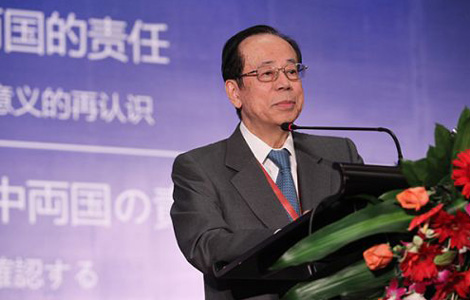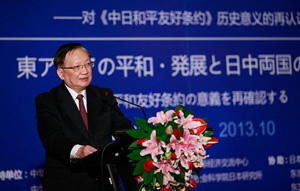Reaching across borders
Updated: 2013-10-28 07:04
By Zhou Wa in Beijing and Chen Jia in Los Angeles (China Daily USA)
|
||||||||
China seeks to improve relations with neighbors
China has become more engaged in making diplomatic overtures to neighboring countries, and Chinese leaders have been pushing for new ways to improve cooperation and resolve remaining issues with its neighbors, analysts said.
Chinese leaders met last week with Russian Prime Minister Dmitry Medvedev, Indian Prime Minister Manmohan Singh and Mongolian Prime Minister Norov Altankhuyag - all of whom happened to be in China at the same time.
It is rare for three foreign heads of state from neighboring countries to begin their visits to China on the same day.
In a conference on the diplomatic initiatives with neighboring countries, President Xi Jinping stressed the important role they play in China's development, and Beijing's determination to seek common development with them.
It shows that the new Chinese leadership attaches more importance to its diplomacy related to bordering countries, said Jin Canrong, a professor on international affairs at Renmin University of China.
"China has become more active in strengthening cooperation with neighboring countries and resolving remaining issues with them. It shows that China, with its growing national power, has become more confident in its diplomacy," Jin said.
He said that the lack of mutual trust between China and the United States, and differences with China's neighboring countries are two major issues in Beijing's diplomacy.
After Xi built greater mutual trust with the US during his visit to that country in June, China has focused on enhancing cooperation and resolving problems with neighboring countries, he added.
"China's border-nation diplomacy based on economic cooperation has become more practical," said Wang Fan, a professor on international affairs with China Foreign Affairs University.
"China hopes to tell neighboring countries it would like to share benefits brought by dynamic economic development with them. It is not a 'slogan', it is based on solid cooperation."
All Russian, Indian and Mongolian leaders left China with cooperation projects.
On Tuesday, Premier Li Keqiang and Medvedev co-chaired the 18th regular meeting between the Chinese and Russian heads of government, resulting in the signing of 21 deals in various fields, including the energy and financial sectors.
In an online chat with Internet users, Medvedev said that Russia will supply an additional 10 million metric tons of crude oil a year to China over the next decade.
During Altankhuyag's first visit to China as prime minister, he and Li signed a document that outlines key areas of cooperation for the development of their strategic partnership in the medium and long term.
They also witnessed the signing of various documents concerning cooperation in trade, science and technology, finance and infrastructure construction.
Singh's visit also concluded with nine agreements and memorandums of understanding on issues that include defense, transportation, education and exchanges between cities.
The two countries also pledged to enhance cooperation with India on infrastructure construction, including railways, to push forward the development of the BCIM Economic Corridor, which encompasses Bangladesh, China, India and Myanmar.
An agreement on border defense cooperation drew much attention. The deal was interpreted by Chinese and Indian media as a milestone and a major step forward to resolving the remaining border issues between the two countries.
"It shows China, instead of putting problems aside, has become more active in resolving problems," Wang said.
"What China wants is to resolve the remaining issues through efficient cooperation."
He said that the importance that China has attached to its neighboring countries is also a response to Washington's Asia-Pacific pivot strategy.
Referring to the overlapping visits by the three leaders to China, US State Department spokeswoman Marie Harf said at a daily news briefing on Thursday that Washington welcomes good relations among countries in the region, and they will not challenge US interests.
Under its Asia-Pacific pivot strategy, the US increased its involvement in Asia-Pacific affairs as well as its military presence in the region, which put great pressure on China and triggered some problems in the neighboring region.
"China responded to this new trend with the more-tolerated idea of cooperation rather than confrontation. This cooperation covers China's neighbors in all directions," Wang said.
Beside cooperation with Russia and Mongolia in the northwest, Xi also proposed during his visit to Central Asia in September building a Silk Road economic belt with that region's countries.
In the south, China, India, Myanmar and Bangladesh are eager to promote economic cooperation through the building of the BCIM Economic Corridor.
In the southeast, China has taken a series of actions to tackle maritime problems with neighboring Southeast Asian countries concerning the South China Sea issue. Both Xi and Li visited the region in early October and initiated the idea to strengthen economic cooperation with the countries through a maritime Silk Road.
In Vietnam, Li and Vietnamese Prime Minister Nguyen Tan Dung pledged to establish a bilateral working group to discuss joint maritime development, a move interpreted by analysts as a way to resolve the South China Sea issue.
"The joint working group proposal in particular sends a positive signal to the international community that China and Vietnam want to solve difficult problems through cooperation," said Wu Shicun, president of the National Institute for South China Sea Studies.
"That shows China is directly facing the thorny issues in border-country diplomacy and actively seeking solutions."
Three days before the visit to Vietnam, Li and Brunei Sultan Hassanal Bolkiah promised in a joint statement to encourage closer joint exploration and exploitation of maritime oil and gas resources in the South China Sea.
"The Chinese government's efforts to reconcile territorial disputes through peaceful means are welcome. Hopefully, these initiatives will pave the way for a peaceful resolution of other contentious disputes as well," said Phillip Lipscy, a political science professor at Stanford University in California.
"Pursing peaceful cooperation in some cases might give the government greater room to stand firm against other countries - most importantly in the disputes with Japan and the Philippines."
George Koo, an international business consultant and board member of New America Media, said that recent agreements with Vietnam and Brunei reinforce the idea that bilateral agreements with individual disputing countries can be effective in easing tension over the South China Sea.
In September, China for the first time officially consulted with the 10 members of the Association of Southeast Asian Nations about a code of conduct under the framework of the Declaration of Conduct in the South China Sea.
During their consultations, Chinese and ASEAN senior diplomats promised to "eliminate the distractions" of territorial issues. The meeting also authorized the Joint Working Group on the implementation of the declaration to make consultations related to the code in the future.
Contact the writer at zhouwa@chinadaily.com.cn
|
(From top) Myanmar President U Thein Sein, Kazakh President Nursultan Nazarbayev, Russian Prime Minister Dmitry Medvedev and Indian Prime Minister Manmohan Singh have all benefited from China's border diplomacy. |
(China Daily USA 10/28/2013 page8)

 Serena beats Li Na for WTA title
Serena beats Li Na for WTA title
 Nuclear submarine fleet comes of age
Nuclear submarine fleet comes of age
 5 pharmacies begin to sell baby formula
5 pharmacies begin to sell baby formula
 The suave style of America's dapper dynasty has arrived
The suave style of America's dapper dynasty has arrived Mother and four children stabbed to death in New York
Mother and four children stabbed to death in New York
 China Fashion Week S/S 2014: day 2
China Fashion Week S/S 2014: day 2
 Demonstrators protest against govt surveillance in US
Demonstrators protest against govt surveillance in US
 Where art thou, my love?
Where art thou, my love?
Most Viewed
Editor's Picks
|
|

|

|

|

|
Today's Top News
3 die after car crash at Tian'anmen Square
ABC apologizes for offensive words on Chinese
NQ Mobile hits back after US stock plunge
Jewelry exhibit dazzles Southern California
Obama aware of spying on Merkel: German paper
High speed versus history
States gear up for symposium
Cousin killed mom, 4 kids
US Weekly

|

|








